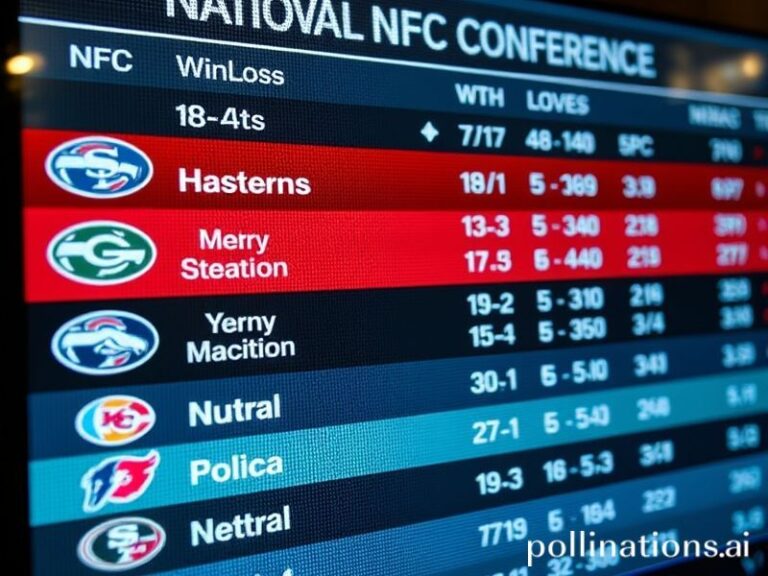Oklahoma vs Temple: A Post-Colonial Gladiator Match for the Streaming Age
Oklahoma vs Temple: A Dispatch from the Imperial Margins
By Sergei “Sarge” Volkov, Senior Correspondent, Dave’s Locker
The alert pinged in from a bar in Tbilisi, a city that knows something about being a buffer zone between empires. A college football game—Oklahoma versus Temple—was trending worldwide. Not because the Sooners might drop 50 points on the Owls (they probably will, and Vegas has priced that inevitability like a Russian energy futures contract), but because this particular collision of red-clad heartland titans and a commuter school from North Philadelphia has become a perfect parable for our hilariously lopsided planet.
To the uninitiated, the matchup looks like a typo. Temple, a program that has changed conferences more often than a Swiss banker changes passports, travels to Norman, Oklahoma—a town whose football stadium becomes the state’s third-largest city six autumn Saturdays a year. Global viewers, fresh off a summer of heat domes, drone strikes, and crypto collapses, are tuning in for the same reason Romans once queued for gladiators: the comforting certainty that somebody is about to be devoured, and it isn’t us.
From the vantage of a Nairobi rooftop, where Chinese-financed 5G towers bristle like steel giraffes, the broadcast feed carries a surreal overlay. Kenyan sports-café patrons watch million-dollar athletes wearing “ amateur” status the way oligarchs wear sanctions—awkwardly, but profitably. Oklahoma’s roster is a petro-state all its own: monetized by TV deals larger than the GDP of Montenegro, fueled by booster money so oily it could be piped straight from the Permian Basin. Temple, meanwhile, is the geopolitical equivalent of a UN peacekeeping budget: earnest, underfunded, and doomed to second-tier status.
In Seoul, gamblers on their lunch break scroll micro-betting apps that now let you wager on the exact second Oklahoma’s quarterback checks his smartwatch for NIL notifications. The spread is 30.5 points, roughly the same margin by which global carbon targets miss reality. When the camera pans to the Temple sideline—where an assistant coach is Googling “how to stop a triple-option with three walk-ons and a grad transfer from D-III”—the Koreans laugh so hard their bibimbap goes cold. Schadenfreude, like kimchi, travels well.
Zoom out further. In the Brussels press room where I once watched EU ministers argue about fish quotas, today’s agenda features a sidebar titled “American Excess: Cultural Soft Power or Glorified Livestock Auction?” The Oklahoma marching band—350 strong, armed with more brass than a NATO rapid-response unit—has become Exhibit A. Meanwhile, Temple’s 110-member band flew coach, sharing overhead bins with a debate team and two emotional-support ferrets. Somewhere, a European think-tanker is already drafting a white paper on asymmetrical symbolism.
Yet the joke is on us, the cosmopolitan voyeurs. By halftime the worldwide stream will have burned through enough server farms to power Reykjavik for a week, all so we can tweet smugly about American excess. The carbon footprint of our moral superiority rivals that of the Sooner Schooner itself—an actual Conestoga wagon dragged by ponies named Boomer and Sooner, because nothing says 21st-century entertainment like cosplaying the 19th-century land run that ethnically cleansed Indigenous tribes. History doesn’t repeat itself; it just secures better broadcast rights.
Back in Norman, the final whistle will sound. Oklahoma covers, Temple collects a seven-figure payout for the ritual sacrifice, and both universities’ compliance officers file the paperwork that keeps the NCAA’s plantation economy humming. In Dubai, a sheikh updates his fantasy roster; in São Paulo, a favela kid sells bootleg merch outside the metro; in Kyiv, soldiers on trench rotation huddle around a cracked iPhone to watch the last two minutes because, hell, even war pauses for third-and-long.
The world keeps spinning, unequal and absurd, powered partly by natural gas and partly by our bottomless appetite for narratives where winners win bigger and losers are compensated just enough to remain politely defeatable. Somewhere in the cosmos, an alien anthropologist logs the data: “Species broadcasts ritualized combat to distract from resource depletion. Recommends immediate quarantine.”
Until then, grab your popcorn—preferably non-GMO, ethically sourced, and carbon-offset, though we both know it isn’t. The second half is about to kick off, and the planet’s collective denial is a hell of a tailgate.







